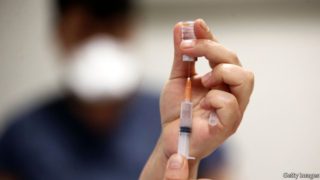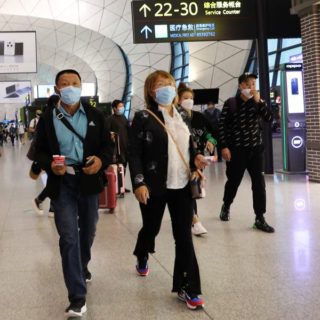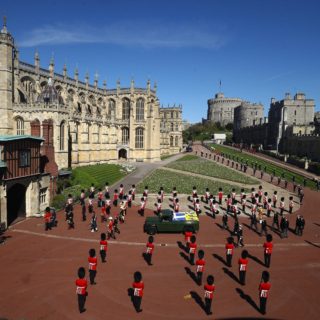Not everyone is prepared to wait their turn
WHEN THE first covid-19 vaccines began to be distributed in December, Jürgen Stock, the secretary-general of Interpol, the world’s policing body, called them “the liquid gold of 2021, the most precious thing to distribute”. When something is precious, and in short supply, sharp practice, corruption and crime may not be far away.
At least 11 covid-19 vaccines have so far been approved for use in at least one country, and more are in the pipeline. The makers of these jabs claim they can, theoretically, produce about 12.2bn shots by the end of 2021, more than enough to give two doses to each of the 5.8bn adults in the world. But production delays are already slowing things down, and the vaccines made will not be distributed evenly. At least 40% of all vaccine orders come from rich countries with just 18% of the world’s population. Within those countries, some groups are being given priority access to vaccines: the elderly, key workers, and people with certain health conditions. Everyone else—individuals and countries alike—is being told they will simply have to wait. Many are not willing to.
The underhand ways in which people are trying to get their hands on covid-19 vaccines can, roughly, be divided into three categories. The first consists of legal but ethically dubious actions, in which people with means try to exploit loopholes in countries where vaccines are already available. In America, for example, states have been allowed to determine their own roll-out strategies, leading to discrepancies between them. “The states are all over the place,” says Arthur Caplan, a professor of medical ethics at the Grossman School of Medicine at New York University. “[Florida] basically said, ‘Get in line and we’ll vaccinate almost anybody.’” Florida at first announced it would give a shot to anyone aged 65 or over who turned up. The state has since tightened the rules, requiring ID to prove state residence, to crack down on people travelling there to get vaccinated. But Florida has so far given more than 80,000 doses, out of a total of more than 3m, to people living elsewhere, according to official state figures. Meanwhile, Mr Caplan has heard of some luxury “concierge” medical practices, which charge patients hefty annual fees in return for the best in round-the-clock care, that are getting hold of vaccines for their clients.
“Vaccine tourism”, as seen in Florida, is also taking off on an international level. In January the British press reported that Knightsbridge Circle—a luxury lifestyle club—had been flying members to the United Arab Emirates to receive shots of the vaccine developed by Sinopharm, a Chinese company, which is not currently approved in Britain. The UAE does not seem averse to using vaccines to market itself more widely, either. A government campaign to get “digital nomads” (remote workers) to move to Dubai stresses that all residents are eligible for a jab. Cuba is also prepared to use the lure of vaccination. The country, whose economy is heavily reliant on tourism, has said that holidaymakers will be offered its homegrown Soberana 02 vaccine once it is approved (it is still undergoing trials).
The second category of vaccine shenanigans is through political favours and preferential access. In January the Philippines’ Senate began an enquiry into why, before any covid-19 vaccine was even authorised in the country, bodyguards of Rodrigo Duterte, the president, were inoculated with jabs smuggled in from China. (Senior members of the cabinet were also rumoured to have received shots.) Evidence of queue-jumping has cropped up in many places. On February 23rd the World Bank threatened to pull its funding for Lebanon’s vaccination programme after 16 lawmakers were vaccinated inside the parliament building, possibly violating the World Bank’s stipulation that, to curb corruption, Lebanese citizens should register for their jabs online. Argentina’s health minister resigned after reports that influential people in the country were able to get shots without following proper procedure. Peru’s health and foreign ministers also quit over accusations that hundreds of officials had been vaccinated before a national immunisation programme began. In other countries, including America, politicians have been classed as essential workers and vaccinated early without fuss.
Third comes the black market, which has flourished at every stage of the pandemic. In March 2020, amid shortages of personal protective equipment, authorities in Thailand busted an operation reselling used face masks. Remdesivir, a drug used in the treatment of covid-19 and in short supply, was available in India and Venezuela at many times its retail price. In China, buyers snapped up similar drugs used to treat a different coronavirus in cats. In Pakistan, doctors witnessed a flourishing trade in the blood plasma of recovered patients, which was touted as a rapid route to immunity.
As for vaccines, on December 2nd—the day that Britain became the first country to authorise a fully tested covid-19 vaccine for emergency use—Interpol told governments to brace themselves for a wave of crime “in relation to the falsification, theft and illegal advertising” of jabs. So far, just a few instances have been reported. In January, Ukrainian police launched an investigation into people paying €3,000 ($3,600) a pop to receive unauthorised jabs, which they speculated had been brought in from Israel. In February, Italian authorities began investigating offers made to officials in the Veneto region from “unnamed intermediaries” to sell them 27m doses of the Pfizer/BioNTech vaccine outside of the country’s procurement scheme. And this week police in eastern China arrested more than 80 people after seizing thousands of doses of fake vaccines destined for export. Hundreds of similar vials were also found in South Africa. Interpol said the seizures were just “the tip of the iceberg” of crime related to covid-19.
Black-market vaccines can be dangerous. They can be stored and administered incorrectly, or might be outright fakes. Vaccine queue-jumping has less obvious ill-effects, though it rankles when the well-connected or well-heeled barge to the front, and those shoved aside may suffer. And so long as life-saving vaccines are in short supply in one or other part of the world, the unscrupulous and the desperate will try schemes, stunts and swindles that promise a short-cut to immunity.
This article has been updated since its publication.
By The Economist





